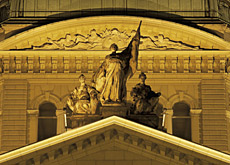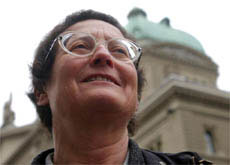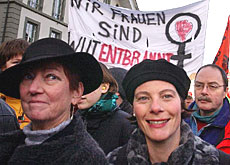Women politicians revive issue of quotas

Women politicians from three of Switzerland’s four main parties say they want the issue of quotas for women to be put back on the political agenda.
Speaking after a congress in Bern, representatives from the Christian Democrats, Radicals and Social Democrats said women were under-represented in the corridors of power.
Five years after Swiss voters rejected by a big margin a people’s initiative demanding quotas for women in politics, many of the country’s female politicians believe a rethink is long overdue.
“It’s time to break a taboo,” said Barbara Perriard, general secretary of the women’s section of the centre-right Radical Party.
Perriard added that the idea of quotas guaranteeing cantonal, regional or language representation was acceptable to virtually everyone.
“But when you suggest applying this to ensure fair representation for women, there is a lot of opposition,” she said.
According to Radical politicians, it is up to the individual parties to take the first step and come up with concrete proposals. They say these should go beyond simply recommending that 30 per cent of election candidates should be women.
They suggest, for example, introducing separate lists of male and female candidates, or fixing a date by when a minimum number of women should be elected to the federal parliament.
If this were to fail, then quotas could be introduced to ensure fair representation. For the next federal elections, the Radical women’s section will publish a guide on how to promote female candidacies.
Consultations
The Radical Party is the party where women have the most to gain. The centre-right Christian Democrats have less of a problem since women already make up a third of their parliamentary representatives.
The centre-left Social Democrats, like the Greens, say they are in favour of quotas. Women from these parties are far better represented in parliament and local assemblies.
“We are happy that the centre-right women want to reconsider the introduction of quotas,” said Julia Gerber Rüegg, vice-president of the Social Democrat women’s group.
The rightwing Swiss People’s Party, which was absent from Friday’s congress, has repeatedly said it is opposed to quotas.
All the parties involved in Friday’s talks will now consult their rank-and-file. “We will try and find a common position for all our parties when we get together again in 2006,” said Perriard.
The congress was held in response to a double slap in the face for women in December 2003 when the then justice minister, Ruth Metzler, was dumped from the cabinet.
Christine Beerli, a candidate from the centre-right Radical Party, was turned down for a place in the seven-member cabinet in favour of her party colleague, Hans-Rudolf Merz. That left Social Democrat Micheline Calmy-Rey as the only woman in the government.
swissinfo with agencies
There is only one woman in Switzerland’s seven-member cabinet, Micheline Calmy-Rey.
There are 50 women in the House of Representatives (25%) and 11 in the Senate (23.9%).
On average, there are 15.7% of women in the world’s national parliaments.
This figure reaches nearly 40 per cent in Scandinavia, but only 6.5% in Arab states.
Quotas for women in politics is not a new idea in Switzerland.
In 1995, an initiative demanding better representation of women in politics was launched.
It was rejected by parliament.
Swiss voters also rejected it massively, with 82% voting against it.

In compliance with the JTI standards
More: SWI swissinfo.ch certified by the Journalism Trust Initiative


You can find an overview of ongoing debates with our journalists here . Please join us!
If you want to start a conversation about a topic raised in this article or want to report factual errors, email us at english@swissinfo.ch.